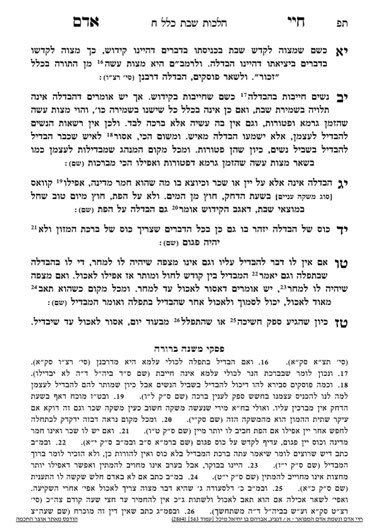We are beginning siman 13, where the Chayei Adam discusses acceptable liquids for havdalah. The Chayei Adam writes that havdalah may be recited on wine, beer, other similar liquids which are chamar medina, and even kevas when one has no choice. The Mishnah Berurah describes kevas as a grass of sorts which was soaked in water and produced a drink. it was a drink of poor people. Although the Chayei Adam allows one to use kevas, the Mishnah Berurah brings from the Taz that it cannot be used. The Mishnah Berurah suggests that maybe at the times of the Chayei Adam, it became more chashuv of a drink, and that is why the Chayei Adam holds it can be used.
The Chayei Adam continues, and writes that one cannot recite havdalah on bread. Kiddush is seen as the preamble to a meal, so bread can be used. Havdalah is not the preamble to a meal, but a separate entity. However, the Chayei Adam clarifies that when making havdalah/kiddush on Motzei Shabbos which is also a Yom Tov, in the same way that the kiddush is made on bread, the havdalah, which is included in the kiddush, can be recited on bread as well.
The Mishnah Berurah writes that in general, when it comes to kiddush, Chazal prefer that one use wine. However, if one significantly prefers bread to wine, they may use bread even if wine is available. The Mishnah Berurah points out that in this case, where one is making kiddush and havdalah at the same time, even if one prefers bread we would not allow them to use bread if they have the option of wine, because of the havdala being said.
In siman 14, the Chayei Adam writes that the halachos of the kos for havdalah are equivalent to the halachos of the kos for kiddush, which are equivalent to the halachos of the kos for birchas hamazon. These include that the kos should be shaleim, the wine should not be pagum, and so on (see S167).
In siman 15, the Chayei Adam discusses a situation in which a person has no wine nor chamar medina. If the person anticipates that they will not obtain wine or chamar medina until Sunday Evening, they can eat immediately. If they anticipate that they will obtain wine or chamar medina at some point on Sunday, they are obligated to refrain from eating until he makes havdalah (see also S222).
Summary
- Havdalah can be recited on wine, beer, or chamar medina. It cannot be recited on bread, unless one is reciting havdalah within kiddush (i.e., Motzai Shabbos going into Yom Tov).
- Although regarding kiddush, if one significantly prefers bread to wine, they may recite kiddush on bread even if they have wine available, when reciting havdalah within kiddush one cannot use bread unless they have no wine.
- The halachos for the kos of havdalah are the same as the halachos of the kos for kiddush and birchas hamazon.
- If one will not obtain liquid for havdalah until Sunday night, they can eat immediately. If they will obtain liquid before Sunday night, they must refrain from eating until they make havdalah.



